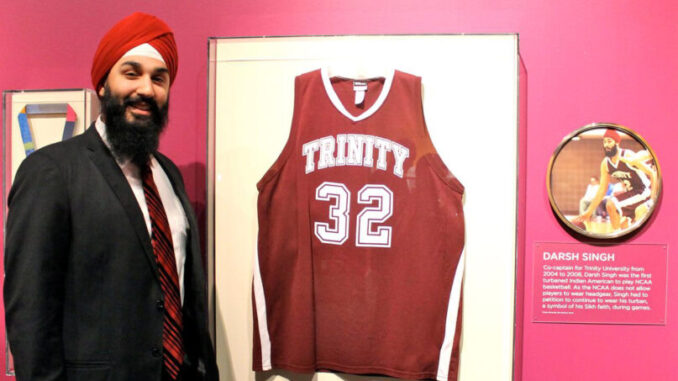
(RNS) — This past week, I joined a virtual hearing in the state of Maryland about new legislation for inclusive religious attire in school athletics. I was the old man on the call, as I often am these days, and I listened as child after child testified about their experiences playing school sports and the undue challenges they faced.
Young Muslim girls and a young Sikh boy shared heartbreaking accounts of the discrimination they encountered, not just from opposing teams and fans, but even from the very institutions that were meant to serve them. My daughter in elementary school sat with me, listening to the stories of these kids, and I realized this wasn’t just about my childhood or even the children before me; this was about my own kids, too.
I felt so touched by their stories that I threw out the testimony I had prepared and decided to speak from the heart. If what these kids shared didn’t move the audience, then I didn’t know what would. Here’s an overview of what I shared from my personal experiences of discrimination in sports.
My brothers and I loved sports growing up, and as kids, we dreamed of playing professional soccer and basketball. We played club and recreational, and we played for our middle school basketball teams.
Imagine our surprise when our oldest brother, Harpreet, went to try out for the high school basketball team and was told the state rules didn’t allow him to play with his turban. Rather than playing the sport he loved and deserved to play, my brother spent his entire freshman season petitioning the state governing body to change their rules to allow him to play.
Soccer was my primary love, and I, too, had encounters with religious discrimination. After multiple incidents where referees and opposing coaches insisted I couldn’t play while wearing a turban, I began petitioning the United States Soccer Federation to change its rules to allow religious minorities to play while maintaining their religious garb. I remember thinking how unfair it was to be asked to choose between two things I cherished most: my love for my faith and my love for sports. I also remember wondering how this could be legal. Hadn’t we learned in school that religious freedom was one of our country’s founding principles?
By that point we had learned an important lesson: It wasn’t enough to seek an exception to a rule that discriminated against us; we needed to ensure better rules for everyone in our communities. With my parents’ guidance, we helped create a change in the rulebook for the United States Soccer Federation. But my parents were clear: This couldn’t just be about giving me the right to play soccer, or even just about allowing Sikhs to play with their turbans — this rule had to explicitly account for everyone, including Jews who wear kippahs and Muslims who wear hijabs. Instead of putting the onus on the player to prove their need for accommodation and attain permission to play, this rule presumed inclusion for all.
A few years later, my younger brother Darsh blossomed into a high school basketball star and became the first turbaned basketball player in NCAA history. His jersey hung in the Smithsonian — an inspiration for young people of all backgrounds that they can overcome the barriers that obstruct them.
So why are we still here, fighting for inclusive legislation all these years later?
What if we learned from our experiences of hardship and helped remove some of the inequitable barriers our children face? What if we recognized some rules are unnecessarily exclusive and put people we care about in the same tough positions my brothers and I faced growing up — of having to make a false choice between our love for faith and love for sports?
The Maryland House of Delegates is reviewing House Bill 515, a bill that seeks to ensure students are no longer excluded from school athletics due to the religious attire they wear.
Zainab Chaudry, Maryland’s director for the Council on American-Islamic Relations (CAIR), spoke to how this proposed legislation would help create a more inclusive America, especially for religious minorities:
A student’s religious beliefs should never be a barrier to participation in school activities, including athletics. We welcome the introduction of House Bill 515 and its companion, SB 951, which would ensure that students of all faith backgrounds are able to participate in school athletics without having to compromise their values and beliefs. We urge state lawmakers to support the bill and call on community members to join us in advocating for this important piece of legislation.
The next step to me is clear. It’s time we begin updating our policies to account for the diverse communities that make up America — and that includes religious communities. I look forward to seeing this change in our society. This month Maryland has the opportunity to set an example for what our country can and should be.
END

Be the first to comment